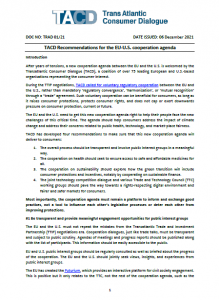After years of tensions, a new cooperation agenda between the European Union and the United States is welcomed by the Transatlantic Consumer Dialogue (TACD), a coalition of over 75 leading European and U.S.-based organisations representing the consumer interest.
During the Transatlantic Trade and Investment Partnership (TTIP) negotiations, TACD called for voluntary regulatory cooperation between the EU and the U.S., rather than mandatory ‘regulatory convergence’, ‘harmonization’, or ‘mutual recognition’ through a free trade agreement. Such voluntary cooperation can be beneficial for consumers, as long as it raises consumer protections, protects consumer rights, and does not cap or exert downwards pressure on consumer protection, current or future.
The EU and the U.S. need to get this new cooperation agenda right to help their people face the new challenges at this critical time. The agenda should help consumers address the impact of climate change and address their concerns related to public health, technology, and market-place fairness.
 TACD has developed four recommendations to make sure that this new cooperation agenda will deliver to consumers:
TACD has developed four recommendations to make sure that this new cooperation agenda will deliver to consumers:
- The overall process should be transparent and involve public interest groups in a meaningful way.
- The cooperation on health should seek to ensure access to safe and affordable medicines for all.
- The cooperation on sustainability should explore how the green transition will include consumer protections and incentives, including by cooperating on sustainable finance, right to repair, and food policies.
- The joint technology competition dialogue and various Trade and Technology Council (TTC) working groups should pave the way towards a rights-respecting digital environment and fairer and safer markets for consumers.
Most importantly, the cooperation agenda must remain a platform to inform and exchange good practices, not a tool to influence each other’s legislative processes or deter each other from improving protections.
Read all the recommendations here
Further readings:
- TACD Positive Consumer Agenda: New Rules for the Global Economy, 2017.
- TACD’s Transatlantic Consumer Checklist for a new EU-U.S. Cooperation Agenda, 2021.
- TACD’s Resolution on Regulating Digital Services, 2021.
